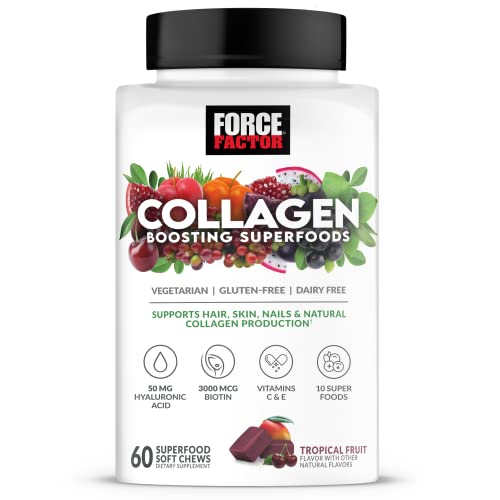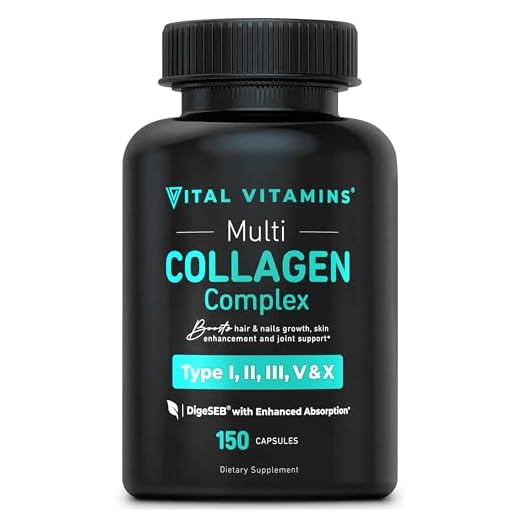Boosting collagen production is crucial for anti-aging benefits as collagen plays a key role in skin elasticity and firmness. Shocking fact: Did you know that after the age of 20, collagen production decreases by about 1% each year, leading to visible signs of aging over time? This guide will provide you with practical steps to enhance collagen production and promote youthful skin.
Revitalize Your Skin with Top Picks



Understanding Collagen
Understanding Collagen
Learn about collagen, a crucial protein that provides structure to your skin, tendons, and ligaments. Collagen plays a vital role in skin health by maintaining firmness, elasticity, and hydration. As we age, our collagen production naturally decreases, leading to visible signs of aging such as wrinkles, fine lines, and sagging skin. To combat these effects, ensure you’re well-informed about collagen and its significance in maintaining youthful skin. Keep reading to understand how you can support collagen production and promote healthy, vibrant skin!
Healthy Diet and Hydration
- Incorporate collagen-boosting foods:
- Add berries, such as blueberries, strawberries, and raspberries, to your daily meals.
- Include fish rich in omega-3 fatty acids like salmon and mackerel in your diet.
- Consume green vegetables like spinach, kale, and broccoli regularly.
- Stay hydrated for healthy skin:
- Drink at least 8-10 glasses of water per day.
- Opt for herbal teas or infused water for added hydration.
- Avoid sugary drinks and excessive caffeine intake to keep your skin hydrated.
Skincare Routine
Include products that contain retinol, vitamin C, and peptides in your skincare routine to boost collagen production and shield your skin from free radical harm. Retinol aids in reducing fine lines and wrinkles by stimulating collagen synthesis. Opt for a retinol serum like “The Ordinary Retinol 0.5% in Squalane” and apply it in the evenings on clean, dry skin.
Vitamin C is a potent antioxidant that brightens the skin and protects it from environmental stressors. Integrate a vitamin C serum such as “Skinceuticals C E Ferulic” into your morning routine after cleansing. Gently massage a few drops onto your face and neck to reap its benefits.
Peptides help in firming and toning the skin by promoting collagen formation. Incorporate a peptide-rich moisturizer like “Drunk Elephant Protini Polypeptide Cream” into your daily regimen. Apply it after your serums to lock in hydration and support your skin’s elasticity.
Sun Protection
Apply sunscreen daily to shield your skin from harmful UV rays that can lead to collagen breakdown, accelerating the aging process. Choose a broad-spectrum sunscreen with an SPF of at least 30. Before heading outside, generously apply the sunscreen to all exposed areas of your skin, including your face, neck, arms, and legs. Remember to reapply every two hours or more frequently if you are swimming or sweating.
Protective Clothing and Seeking Shade
Wear protective clothing, such as long sleeves, wide-brimmed hats, and sunglasses, to further safeguard your skin from the sun’s damaging effects. When spending time outdoors, seek shade whenever possible, especially during peak sun hours between 10 a.m. and 4 p.m. Be mindful of reflective surfaces like water, sand, and snow, as they can intensify UV exposure. By combining sunscreen application, protective clothing, and seeking shade, you can significantly reduce your risk of premature aging and skin damage caused by the sun.
Regular Exercise
- Incorporate strength training exercises into your routine to boost circulation. Perform exercises like weightlifting, bodyweight squats, and push-ups to enhance blood flow to your skin.
- Practice yoga poses that promote collagen synthesis. Include poses like Cobra, Downward Dog, and Camel Pose to stimulate collagen production in your skin.
- Maintain skin elasticity by regularly engaging in activities like strength training and yoga. These exercises help tone muscles, which in turn supports the skin’s firmness and elasticity.
Supplements
- Incorporate collagen supplements into your daily routine to boost collagen production internally. Look for supplements that contain ingredients like hyaluronic acid and antioxidants, known to support skin health and elasticity.
- Ensure you are choosing high-quality supplements from reputable brands to maximize the benefits for your skin and overall health.
- Consistency is key, so take your chosen supplements regularly as directed on the packaging for best results.
- Remember to consult with a healthcare professional before adding any new supplements to your regimen, especially if you have existing health conditions or are pregnant/nursing.
Professional Treatments
- Consult a dermatologist: Schedule an appointment with a dermatologist to discuss professional treatments like microneedling, laser therapy, or chemical peels. Research and choose a reputable dermatologist with experience in these procedures.
- Discuss treatment options: During the consultation, communicate your skincare concerns and goals clearly to the dermatologist. Listen attentively to their recommendations on whether microneedling, laser therapy, or chemical peels would be most suitable for your skin type and concerns.
- Follow the dermatologist’s advice: After deciding on a treatment plan, follow the dermatologist’s instructions carefully. Be prepared for any pre-treatment requirements and post-treatment care. Keep all follow-up appointments to monitor progress and ensure the best results for boosting collagen production and improving skin texture.
Unlocking Youthful Radiance Naturally
In conclusion, incorporating strategies to boost collagen production can lead to healthier, more youthful skin and help reduce the appearance of aging.
Tools Needed
Expert Skincare Secrets
Maximizing Your Collagen Production
- Include collagen-boosting foods in your diet such as bone broth, fish, eggs, berries, and leafy greens
- Use skincare products that contain ingredients like retinol, vitamin C, and peptides to stimulate collagen production
- Protect your skin from UV rays by wearing sunscreen daily to prevent collagen breakdown
- Incorporate facial massage or micro-needling techniques to promote collagen production in the skin
- Consider taking collagen supplements to support the body’s natural collagen production
Boost Your Collagen: FAQs
How do lifestyle factors such as smoking and sun exposure impact collagen production?
Lifestyle factors such as smoking and sun exposure can negatively impact collagen production. Smoking can reduce collagen synthesis and increase collagen breakdown, leading to accelerated skin aging and wrinkles. Sun exposure can cause the breakdown of collagen due to UV radiation, resulting in sagging skin, pigmentation, and wrinkles. Both smoking and sun exposure can contribute to the degradation of collagen fibers, which are essential for maintaining skin elasticity and firmness.
Can collagen supplements effectively boost collagen levels in the skin?
Collagen supplements may help increase collagen levels in the skin to some extent. However, the effectiveness of collagen supplements in boosting collagen levels in the skin is still debated among experts. Some studies suggest that collagen supplements can improve skin elasticity and hydration, while other studies show mixed results. The body breaks down collagen supplements into amino acids before they are absorbed, and it is not guaranteed that these amino acids will directly increase collagen levels in the skin. It is recommended to consult with a healthcare provider or dermatologist before starting any collagen supplement regimen.
Is collagen production the same in all parts of the body?
No, collagen production is not the same in all parts of the body. Different tissues and organs have varying rates of collagen synthesis based on their specific needs and functions. For example, the skin and bones have high rates of collagen production compared to other tissues like tendons or cartilage.
What is collagen and why is it important for skin health?
Collagen is a protein that is a major component of the skin, making up about 75-80% of the skin’s dry weight. It provides structure, support, and elasticity to the skin. Collagen helps maintain skin firmness and smoothness, and plays a crucial role in wound healing and skin regeneration. As we age, collagen production decreases, leading to wrinkles, sagging skin, and loss of elasticity. Therefore, maintaining collagen levels through a healthy diet, skincare products, and lifestyle choices is important for maintaining skin health.
What role do vitamins and minerals play in collagen synthesis?
Vitamins and minerals play crucial roles in collagen synthesis. Vitamin C is essential for collagen production as it helps convert the amino acid proline into hydroxyproline, a key component of collagen. Other vitamins like Vitamin A, E, and K also support collagen synthesis. Minerals such as zinc and copper are necessary for enzymes involved in collagen formation. Overall, vitamins and minerals are important cofactors in the process of collagen synthesis, which is vital for maintaining healthy skin, bones, and connective tissues.
How does collagen production change as we age?
As we age, collagen production in our bodies decreases. Collagen is a protein responsible for providing structure and elasticity to our skin, joints, and other connective tissues. The decline in collagen production can lead to wrinkles, sagging skin, joint pain, and decreased elasticity. Factors such as sun exposure, smoking, and poor diet can further accelerate the breakdown of collagen in the body. It is important to maintain a healthy lifestyle, including a balanced diet and proper skincare, to support collagen production as we age.
What are some signs that your collagen levels may be low?
Some signs that your collagen levels may be low include sagging skin, wrinkles, joint pain, brittle nails, and thinning hair. Decreased collagen production can lead to these visible signs of aging and decreased structural support in the body.
Are there any medical treatments available to stimulate collagen production?
Yes, there are several medical treatments available to stimulate collagen production. Some common treatments include microneedling, laser therapy, radiofrequency therapy, and certain types of chemical peels. These treatments work by triggering the body’s natural collagen production process, resulting in improved skin elasticity and overall appearance. It is important to consult with a qualified healthcare provider to determine the best treatment option for individual needs.
How long does it take to see results from collagen-boosting treatments?
The time it takes to see results from collagen-boosting treatments can vary depending on the type of treatment used and individual factors such as age, skin condition, and overall health. Generally, visible results from collagen-boosting treatments like creams, serums, or supplements may start to be noticeable within a few weeks to a couple of months. However, more invasive treatments like laser therapy or microneedling may show results sooner, typically within a few weeks. It is important to consult with a healthcare provider or dermatologist for personalized advice and expectations regarding collagen-boosting treatments.





Leave a Reply